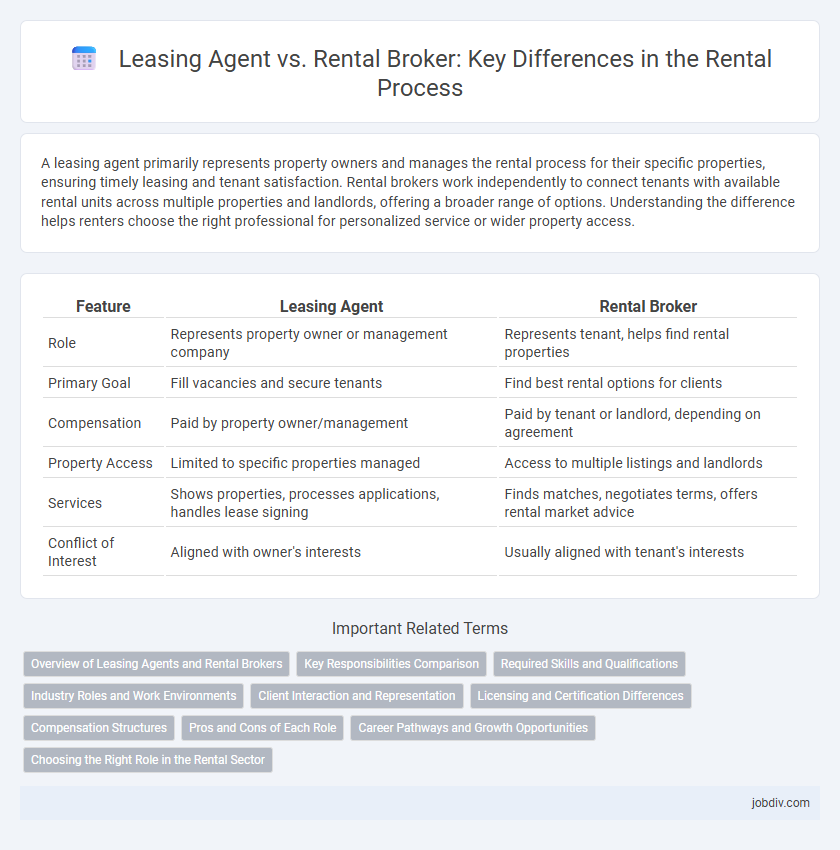A leasing agent primarily represents property owners and manages the rental process for their specific properties, ensuring timely leasing and tenant satisfaction. Rental brokers work independently to connect tenants with available rental units across multiple properties and landlords, offering a broader range of options. Understanding the difference helps renters choose the right professional for personalized service or wider property access.
Table of Comparison
| Feature | Leasing Agent | Rental Broker |
|---|---|---|
| Role | Represents property owner or management company | Represents tenant, helps find rental properties |
| Primary Goal | Fill vacancies and secure tenants | Find best rental options for clients |
| Compensation | Paid by property owner/management | Paid by tenant or landlord, depending on agreement |
| Property Access | Limited to specific properties managed | Access to multiple listings and landlords |
| Services | Shows properties, processes applications, handles lease signing | Finds matches, negotiates terms, offers rental market advice |
| Conflict of Interest | Aligned with owner's interests | Usually aligned with tenant's interests |
Overview of Leasing Agents and Rental Brokers
Leasing agents specialize in managing rental properties by handling tenant applications, conducting property showings, and preparing lease agreements, ensuring smooth interactions between landlords and tenants. Rental brokers act as intermediaries who connect renters with available properties, often offering broader market access and negotiation services on behalf of clients. Both professionals facilitate the rental process, with leasing agents typically employed by property owners and rental brokers operating independently or through agencies.
Key Responsibilities Comparison
Leasing agents primarily manage tenant relations, conduct property showings, and handle lease agreements, ensuring compliance with local rental laws. Rental brokers focus on facilitating transactions between landlords and tenants, often handling multiple properties and providing market analysis to optimize leasing terms. Both roles require strong negotiation skills, but brokers typically engage in broader marketing and brokerage activities compared to the more hands-on responsibilities of leasing agents.
Required Skills and Qualifications
Leasing agents require strong interpersonal skills, knowledge of property management software, and familiarity with local housing laws to efficiently handle tenant applications and leases. Rental brokers must possess a real estate license, deep market knowledge, and advanced negotiation skills to facilitate property transactions between landlords and tenants. Both roles demand excellent communication abilities and attention to detail, but brokers typically need formal certification and broader industry expertise.
Industry Roles and Work Environments
Leasing agents primarily work directly for property management companies or landlords, handling tasks such as property showings, tenant screenings, and lease agreements within apartment complexes or residential buildings. Rental brokers operate independently or with multiple property owners, providing clients with a broader selection of rental options across various neighborhoods and negotiating lease terms on behalf of renters. Both roles require in-depth knowledge of local rental markets, but leasing agents focus on specific properties while rental brokers emphasize client representation and market diversity.
Client Interaction and Representation
Leasing agents primarily represent property owners, managing client interactions to secure tenants and streamline lease agreements. Rental brokers act as intermediaries for tenants, offering personalized property searches and negotiating rental terms on their behalf. Both roles require strong communication skills but differ in their client advocacy focus and contractual responsibilities.
Licensing and Certification Differences
Leasing agents typically require a real estate license issued by the state, which involves completing pre-licensing education and passing a licensing exam to legally negotiate leases. Rental brokers often hold similar licenses but may also need additional broker-specific certifications that authorize them to manage rental properties and represent landlords more broadly. Licensing requirements vary by state, with brokers generally subject to more stringent standards to ensure legal compliance and professional accountability in rental transactions.
Compensation Structures
Leasing agents typically receive a fixed commission based on a percentage of the lease's total value or a set fee per lease signed, providing a predictable income tied directly to rental agreements secured. Rental brokers often earn a higher commission since they may represent multiple properties and facilitate deals across various landlords and tenants, sometimes including bonuses for high-value or long-term leases. Understanding these compensation structures helps tenants and landlords evaluate which professional aligns best with their rental and leasing needs.
Pros and Cons of Each Role
Leasing agents typically work directly with property owners or management companies, offering streamlined communication and often greater control over lease terms, but they may have limited property options restricted to specific portfolios. Rental brokers provide access to a broader inventory of rental properties across multiple landlords, increasing choice for tenants; however, their services might involve additional fees and less direct negotiation power with property owners. Each role presents unique advantages and drawbacks depending on whether priority lies in property variety or personalized leasing support.
Career Pathways and Growth Opportunities
Leasing agents typically begin their careers in property management firms, gaining hands-on experience with tenant relations and lease administration, which can lead to supervisory roles or property manager positions. Rental brokers often operate independently or with agencies, focusing on client acquisition and negotiating rental agreements, offering pathways toward brokerage ownership or specialized real estate consulting. Both career paths require strong interpersonal skills and industry knowledge, but brokers tend to have higher potential for commission-based income and entrepreneurial growth.
Choosing the Right Role in the Rental Sector
Leasing agents typically represent property owners and manage tenant screening, lease agreements, and property showings, specializing in specific rental communities. Rental brokers operate independently, connecting tenants with multiple rental options across various properties, offering broader market access and personalized search assistance. Choosing the right role depends on whether you prioritize dedicated property expertise or a wider selection of rental listings to find the best fit.
Leasing Agent vs Rental Broker Infographic

 jobdiv.com
jobdiv.com